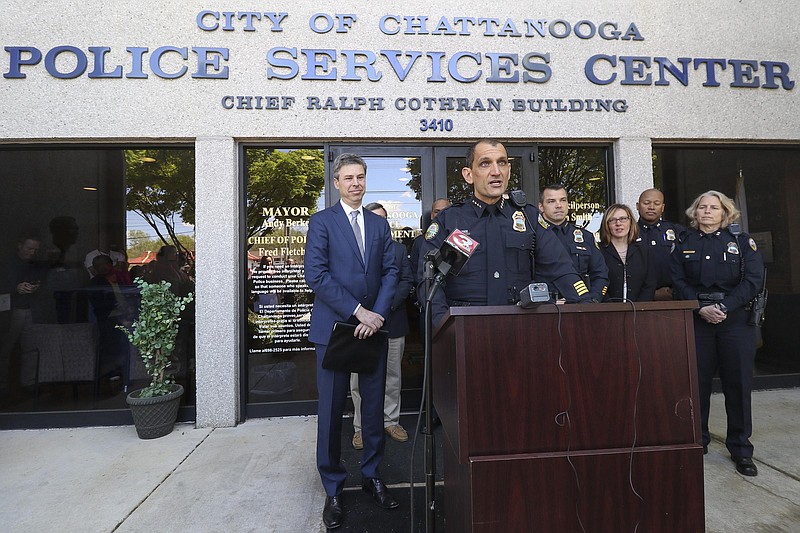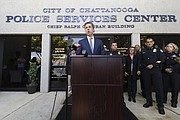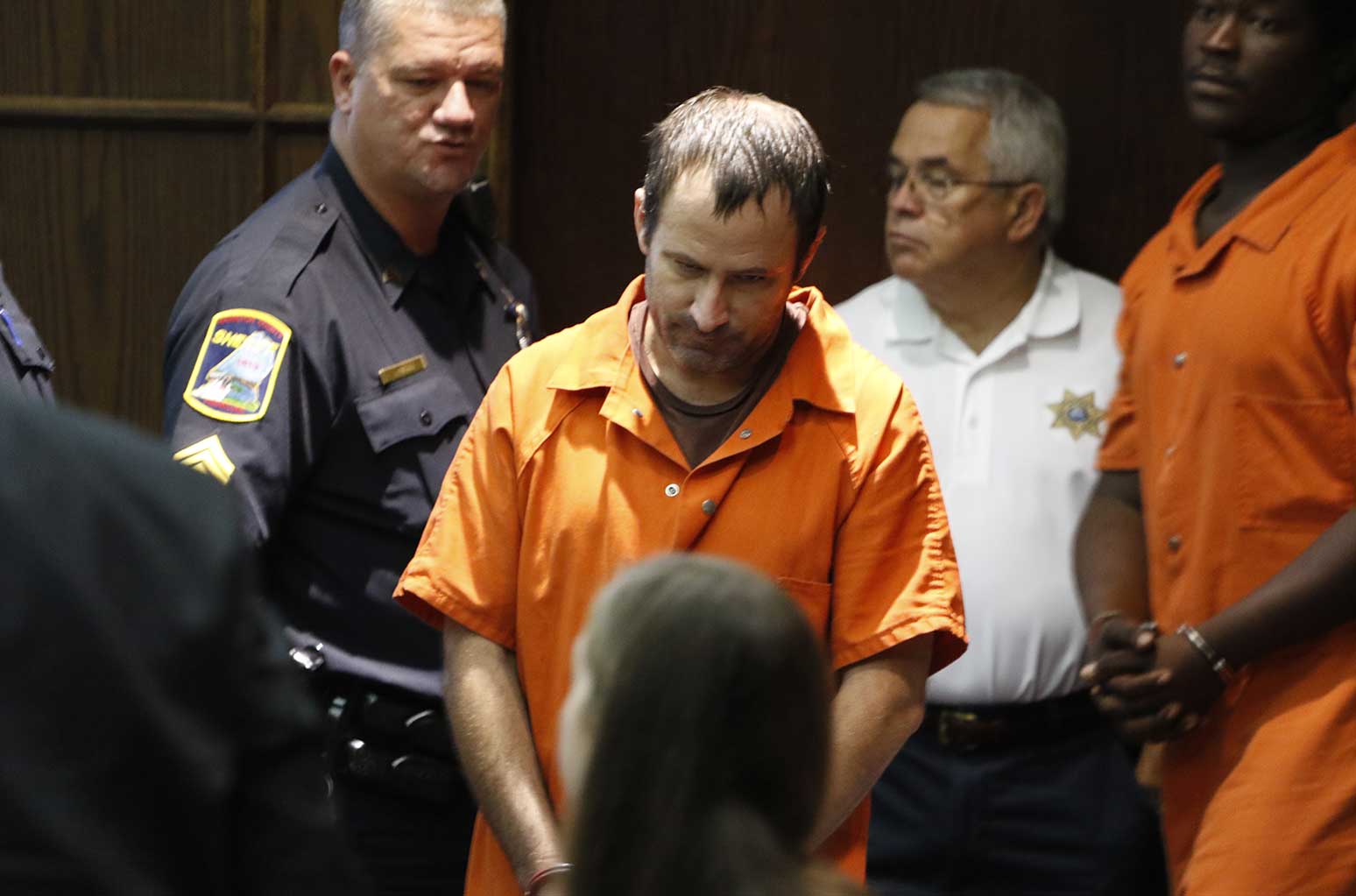After three of the most tumultuous years for local law enforcement in recent history, Chattanooga Police Department Chief Fred Fletcher said Friday he will retire when his contract ends in July.
Since Fletcher was sworn in on June 12, 2014, Chattanooga has weathered a 2015 domestic terrorist attack that left five military members dead, and two horrific crashes - an Interstate 75 accident that claimed six lives in 2015 and the crash of a school bus that killed six Woodmore Elementary School students in 2016. During Fletcher's tenure as chief, he led a wholesale remaking of the department and navigated through the sputtering implementation of the anti-gang Violence Reduction Initiative.
"I do not make this decision lightly," Fletcher said at a news conference Friday afternoon. "There are many reasons why I reached this decision, but ultimately it's a personal decision."

When Fletcher took the job, he promised to "shake the snow globe" at CPD and blitzed through his first year with a laundry list of policy changes that typically reflected his personal philosophy of "community policing" - a framework that revolves around relationships more than arrests.
Mayor Andy Berke celebrated Fletcher's accomplishments as chief of police at the news conference, saying he has been a tremendous advocate for the city time and again.
"Over the course of the last three years, the list of accomplishments for this department is long. Reorganizations to make sure that we're prioritizing the crimes that affect our community the most. First victim services unit. Changing and enhancing our community policing," he said.
"You've given your all to our community, and I thank you for that."
Fletcher was hired away from his department of 20 years in Austin, Texas, partially because of his favorable attitude toward the model of policing which the VRI was built around.
The VRI, one of Mayor Andy Berke's signature programs, relies on "focused deterrence" through cooperation by police, prosecutors and social service groups to crack down on the few who shoot, while offering services such as job training and education to people willing to give up their guns.
Chattanooga has pumped more than $1 million into the initiative, but it has had, at best, mixed results.
Shootings involving gang members have not decreased since the program was launched in March 2014. Instead, they rose from 63 to 80 in 2015 and remained at 80 again in 2016, according to police.
The effort to suppress violent crime was also hobbled in 2015 when 11 of the 12 permanent members of CPD's Street Crimes Response Team requested transfers out of the unit during a 10-day period.
The unit was originally created as the "Crime Suppression Unit" in 2007, but was reorganized under Fletcher as the street crimes team. It is a key component of the VRI, handling many of the plan's logistics by focusing on enforcement.
The Times Free Press reported that the mass exodus was said by sources to be the result of a toxic environment between the team and Fletcher's administration - a unified protest against the way the unit was operating.
In January of this year, CPD officials announced that the number of people working full time on gang and gun violence would be doubled from 20 to 40 and that the street crime unit would be turned into a dedicated gang unit.
Public disagreements also erupted between city officials in March last year with Hamilton County District Attorney General Neal Pinkston trading barbs with Berke, Fletcher and city council members over the initiative's lack of results.
Pinkston claimed police officers were not bringing solid cases to his office to prosecute, and a survey of those cases by the Times-Free Press in February 2016 concluded that many of the cases against gang members were dismissed or settled with a plea bargain and a reduced sentence.
"I am proud of all our strategies and all our efforts," Fletcher said on Friday when asked specifically about VRI. "I will tell you that any failures of the CPD are mine and any successes are [my officers']."
Fletcher was not available later Friday to comment on the successes or failures of the VRI program during his tenure.
Whatever tension may have existed previously, Pinkston stated on Friday he viewed Fletcher positively.
"Over the last three years I've come to respect Chief Fletcher and truly appreciate all he's done to make Chattanooga safer for us all," he wrote in a statement.
"He brought really great ideas and an endless amount of energy to the city's top law enforcement job, and it will be a challenge to find someone as talented and dedicated as Fred Fletcher."
Fletcher said he has not accepted a new job, but he has received several offers. He said in the meantime he is looking forward to spending more time with family out west, where he and his wife have another home in Colorado.
"All of my energies and all my emotions have been focused on Chattanooga, and it's time to focus a little bit on me for a little while and we'll see what happens," he said.
Over the coming weeks a transition plan will be developed to select a new chief.
Councilman Chip Henderson, city council chairman for public safety, said he knew within thirty minutes of meeting Fletcher years ago that out of the 77 people who applied, he was the ideal candidate for Chattanooga chief of police.
"He's become the standard by which I think all chiefs will be judged, and it's certainly been a privilege and an honor to have Chief Fletcher for three years here in Chattanooga," Henderson said. "He will be sorely missed."
Contact staff writer Emmett Gienapp at egienapp@timesfreepress.com or 423-757-6731. Follow him on Twitter @emmettgienapp.
Fletcher timeline
Chosen in April 2014 from 77 candidates at $142,500 a year. Age 46, a 20-year veteran, commander in Austin, fan of High Point model of policing (VRI) Berke said Fletcher stood out because of his leadership skills, energy, desire to be a community leader and his experience reducing drug trafficking in one of the most notorious neighborhoods in Austin, Texas. "The community response I've heard about him has been overwhelming. If you were to put it on a decibel meter it would be deafening," Berke said. "When you want to see the community embrace our police department, having a leader that has proven he can became one with the people he serves is a great start." Confirmed May 13 in council vote after meeting with numerous locals, to start in late June 2014. In Austin, his East Sector crime declined by 14 percent for violent, 9 for property. From 2012 to 2013, violent crime in the region that Fletcher oversaw decreased by 14 percent, and property crime declined by 9 percent Berke Chief of Staff Tra vis McDonough said the city, led by a search firm picked through the best candidates across the country and found that Fletcher was at the top of the list. He said that affirmation was clear when several officers picked Fletcher up from the airport and after two hours of talking with the commander decided he was the right choice. McDonough said the consensus was clear: "This is the guy; you've found the right one." Sworn in June 12, started full time June 25, 2014, with three- year contract and optional three-year renewal. Just before he took over, a top-to-bottom review of the department by the International Association of Chiefs of Police found all levels of Chattanooga Police Department staff display a "high level of commitment and pride in their work." The $100,000, six-month study was part of a $340,000 plan to cut crime approved by the City Council in October 2013. The study noted high crime levels and an increase in robberies and aggravated assaults - primarily shootings. It recommends the department increase its focus on crime prevention and reduction and on building trust and community engagement. Study also found "disconnect" between CPD officers and community on the level of police engagement with citizens. Fletcher said he wanted to "shake the snow globe" and change the department's culture to focus on neighborhood policing. June 28: Three homicides took place on first three days of Fletcher's tenure, along with six nonfatal shootings that week. At that point, shootings were at the same rate as in 2013. July 2014: Fletcher names 20-year CPD veteran David Roddy, along with Capt. Danna Vaughn, Capt. Tracy Arnold and Capt. Eric Tucker, as assistant chiefs August 2104: First "hot spot patrol" deployed in East Lake to get officers out of cars and onto bikes, making personal contacts in high-crime neighborhoods. Fletcher sets up partnerships with 70 community members, such as pastors and civic leaders, to combat "snitches get stitches" ethos, and starts sending officers and going himself to community events like picnics at Chattanoga Housing Authority. He begins reaching out to alienated Hispanic community to build trust and support. November 2014: Seven months into the VRI, homicides are higher than for same period in 2013, but police say gang-related shootings have fallen, 90 people have been arrested and 61 have found jobs through VRI. December 2014: First group of police cadets completes "Community Immersion Project" training, which embeds them in black, LGBT or Hispanic culture they otherwise wouldn't know. Fletcher says police need to understand the communities they serve. December 2014: Longtime Chattanooga Lt. Todd Royval, Fletcher's "point man" on VRI, asks to step down as head of the Crime Suppression Unit. December 2014: Police say shootings fell from 123 in 2013 to 111 in 2014, but figures showed homicides were up from 19 to 27. The New Year of 2015 came in with three shootings and two deaths. March 2015: Fletcher honored as Public Official of the Year by Southeast Tennessee Branch of the National Social Workers Association March 2015: City renews VRI contract for $200,000 through end of the year. Fletcher says the program has helped CPD audit violence in the city and developed a tracking mechanism to follow gang violence. April 2015: Committee appointed by Fletcher proposes revised promotions process to lessen the "good ol' boy" network's influence on promotions. June 2015: At first anniversary on job, public officials and police credit Fletcher for "getting things done" in new community initiatives plus internal reforms including crackdowns on police misconduct, along with implementing new crime analysis and special victims' units. July 2105: Chattanooga officers first on scene of Muhammad Abdulazeez's terror attack at Chattanooga Navy/Marine Reserve center; one officer wounded and police officers shoot and kill Abdulazeez. September 2015: Homicide count (what Fletcher calls "apples-to-apples murders" and not counting July terror attack that took five lives) is at 12, compared to 21 for same period in 2014. Gang-related shootings were at 53 for the year to date, compared with 52 in prior year. September 2015: CPD gets $600,000 grant to hire social workers who will go on police calls to support crime victims. September 2015: City Council votes to renew VRI contract. Fletcher said overall crime down by 19 percent over prior year, and that in program's first 18 months, police hosted seven "call-ins" attended by 134 gang members; conducted eight "enforcement actions" and arested 213. October 2015: Eleven of the 12 members of the Street Crimes Response Team, formerly the Crime Suppression Unit, ask for transfers within a 10-day span. Some cited a toxic environment between the team and Fletcher's administration, while others saw it as protest against switch from crime suppression to community policing. February 2016: Fletcher defends VRI when Chattanooga Councilman Yusuf Hakeem declares it a failure after gang-related shootings and homicides fail to decline over three years of program. March 2016: Feud among VRI coalition becomes public, with DA Neal Pinkston blaming city for underperformance and Fletcher and Berke saying Pinkston has taken himself out of the initiative. Pinkston later announces he'll form separate anti-gang initiative. May 2016: Fletcher shelters Berke's wife after she and her husband, Bobby Stone, fight over his belief she's having an affair with Berke. Fletcher asks TBI to investigate. Domestic violence charges against Bobby Stone later were dropped. Allegations of an affair and criticism of the VRI are issues in mayor's race, though Berke was re-elected. January 2017: Figures show 32 homicides in 2016, up from 30 in 2015 and 27 in 2014. Shootings rose from 114 in 2014 to 119 in 2015 and 132 in 2016. However, Fletcher said the number of gang-related shootings fell from 57 percent of all shootings in 2015 to 58 percent in 2016.


